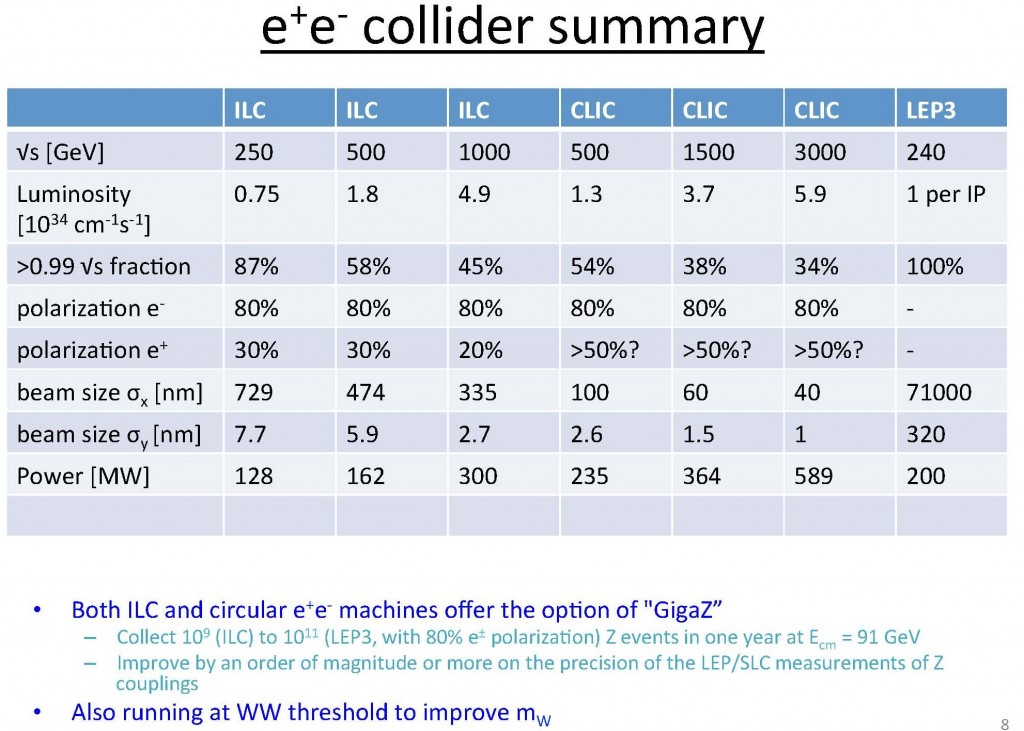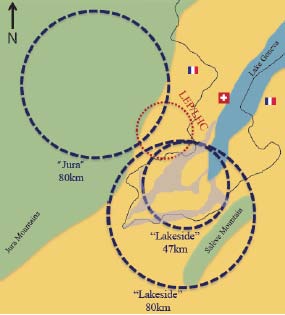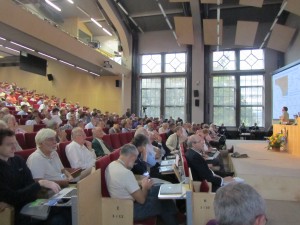When scientists make plans or want to show the results of their work, they write a paper. Nearly 170 such papers recently landed on the desks of the members of the European Strategy Preparatory Group, a part of the European Strategy Group that is charged by the CERN Council to come up with recommendations for a strategy for particle physics in Europe. Every five or six years the strategy process starts anew, in the light of new results or political developments. The first step of the new strategy process was taken in Cracow, Poland, in September, and the CERN Council will take the recommendations to update its Strategy in March 2013.

A slide from one of the summary talks comparing electron-positron collider features. Slide: Terry Wyatt
The first step is always to consult the community, and this is what the recent Cracow meeting was all about. The European particle physics community had submitted project plans and proposals to categories including Accelerator Science and Technology, Physics at the High-Energy Frontier, Physics of Neutrinos or Instrumentation, Computing and General infrastructure. The submissions are available for all to read, and in the meeting in Cracow concise summaries of these papers were presented, followed by long and detailed (as well as very structured) discussions among the almost 500 participants.
It’s nearly impossible to summarise two and a half days of intense talks and discussions on a multitude of different projects, plans and proposals. What emerged, however, mirrors the recommendations from the last Strategy round that give highest priority to the full exploitation of the science potential of the Large Hadron Collider including its upgrades, complemented by a electron-positron precision tool. Accelerator and detector R&D as well as active participation in the global neutrino programme also featured on the list.
However, a new aspect in the discussions was the discovery of the Higgs-like particle at CERN. This new particle led to strong support for a so-called Higgs factory, meaning an accelerator that can study all possible decay channels of the Higgs at an energy in the region of the Higgs particle. Several options were discussed, including a staged ILC or a new proposal for an electron-positron collider in the LHC tunnel, and even a completely new, 80-kilometre ring tunnel was on the discussion table.
Günther Dissertori from ETH Zurich, who summarised the experimental status at the high-energy frontier, pointed out that “at the LHC, we are only at the beginning of the high-energy frontier exploration” – an estimated 95% or more of the LHC’s physics potential is still in the future. While a number of participants pressed for a Higgs factory today rather than tomorrow, a number of others called for caution in planning a new machine – there might be more precision studies in store from LHC results, so a more versatile machine would be more desirable.
The fact that particle physics is not a regional undertaking was made clear by relatively large number of participants from the US and Asia and the understanding that future large-scale projects will be global from the start. Masanori Yamauchi from KEK, who reported on the physics programme in Asia , presented the plans of the Japanese high-energy physics community to host the ILC. With a staged approach of a Higgs-factory ILC at 250 to be upgraded to 500 GeV and later 1 TeV, data taking could start around 2030, he said. He pointed out, however, that “it is essential that we have strong European support from the beginning”.
The community can still submit updated proposals or further input until 15 October. The next step will be a briefing booklet, based on submissions and discussions, that the Strategy Group will use to put together its recommendation proposal in January next year. This also follow a very clear structure, defined by the mandate: “The proposal shall comprise a series of ordered and concise statements of 1-2 lines each, or 1-2 pages in total followed by more detailed presentations that shall not exceed 25 pages.” The Strategy Group submits its proposal to the CERN Council, which will finalise an updated Strategy in March 2013. This is then scheduled to be adopted in a special session of the CERN Council in Brussels in May or June 2013.
Further reading:
- The website of the Open Symposium in Cracow
- An overview over future facilites in high-energy frontier and flavour physics by Terry Wyatt from the University of Manchester



Recent Comments